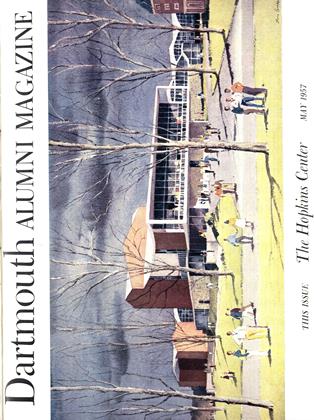I MUST recommend a book that any family library could possess with great profit and that is Life's edition of TheWorld's Great Religions. It contains 190 pages of full-color reproductions plus text which covers adequately Hinduism, Buddhism, Chinese philosophy, Islam, Judaism, and Christianity. The late Paul Hutchinson, for many years editor of TheChristian Century magazine, contributed before he died a fine introduction which I have used for discussion in my classes in Comparative Literature with fine results.
This book contains a lot of new material which did not appear in the Life articles and I am not surprised to learn that pre-publication sale was more than half a million copies.
There is no longer any excuse whatever in not knowing the fundamentals of the world's great religions. As Dr. Hutchinson wrote: "These are critical days for religion. The enormous changes being wrought by technology in every life on every continent and at every level of social advancement, and the even more enormous changes which we can foresee with our dawning perception of the forces of the atomic age, make it imperative that man be saved from that most demonic and destructive of all idolatries - self-worship. Each great religion portrayed in this book attempts to save man from following the road of selfworship to the City of Destruction. All will accomplish that purpose to the extent that, in the words of the prophet Micah, they inspire man 'to do justly, and to love mercy, and to walk humbly with (his) God.'"
In March there appeared a new edition of the popular New England cook book: Foods of Old New England by Marjorie Mosser, with notes and an introduction by the old master, Kenneth Roberts.
Good cooks are educated people Schooled at their aunts' and mothers' knees.
Instinctively they behave in kitchens As in a busy hive behave the bees.
Here are recipes for baked eels, finnan haddie, haddock smother, oyster pie, broiled quail, turkey scrapple, deviled scrambled eggs, chestnut stuffing, Aunt Rose's cinnamon buns and hundreds of others. Throughout one finds pungent remarks by Kenneth Roberst always bristling with truth as well as challenge. A lively book handsomely put out with a charming dustwrapper of an original painting owned by Mr. Roberts. Diet or not, I am going to have some of these dishes if I have to cook them myself!
With the publication of Richard H. Pough's Audubon Western Bird Guide, the amateur or professional ornithologist may, with the previous volumes, AudubonBird Guide and Audubon Water BirdGuide, know just about every bird in the United States. Don Eckelberry does 340 full-color illustrations and Terry M. Shortt adds 138 black and white drawings. Sponsored by the Audubon Society, these excellent books are published by Doubleday.
Even though Philip Booth's book, Letterfrom a Distant Land (Viking, 1957), has been reviewed in this magazine, I do want to say that I enjoyed greatly his poems and especially "Storm in a Formal Garden" and that moving and perceptive poem about Thoreau: "Letter from a Distant Land." As a Thoreauvian in good standing I can recommend it to all who admire that homespun genius who died 95 years ago.
For many years I have been looking for a book which contains the heart of Galileo's work and at last it has come to light in Anchor Books. This is Stillman Drake's edition of Discoveries and Opinions ofGalileo. This book includes "The Starry Messenger," 1610, "Letters on Sunspots," 1613, "Letter to the Grand Duchess Christina," 1615, and excerpts from "The Assayer," 1623. The editing throughout is excellent and if you want to read about the beginnings of our modern atomic world this is a book to dip into.
I am also enjoying Dos Passos' The MenWho Made the Nation, a book concerning Washington, Jefferson, Hamilton, Franklin, Adams, Marshall, Morris, and many others. I am not qualified to judge its fine points but I found it most helpful in understanding the Colonial period which I have covered these many years in Comp. Lit. 13, Types of American Thought (advt.).
A novel to end all college novels is the excellent Half Way Down the Stairs, by Charles Thompson (Harper). Sensationall
 View Full Issue
View Full Issue
More From This Issue
-
 Feature
FeatureExciting Theater Ahead
May 1957 By WARNER BENTLEY -
 Feature
Feature"An Open-Arms Aspect ..."
May 1957 By ANN HOPKINS POTTER -
 Feature
FeatureThe Man Who Designed the Center
May 1957 By ROBERT L. ALLEN '45 -
 Feature
FeatureDramatics
May 1957 By PROF. HENRY B. WILLIAMS -
 Feature
FeatureA New Dimension in Dartmouth Education
May 1957 -
 Feature
FeatureA Stimulus to Town Development
May 1957 By PROF. HUGH S. MORRISON '26,
HERBERT F. WEST '22
-
 Article
ArticleHanover Browsing
June 1938 By HERBERT F. WEST '22 -
 Article
ArticleHanover Browsing
February 1940 By HERBERT F. WEST '22 -
 Books
BooksFRATERNITY VILLAGE,
October 1949 By Herbert F. West '22 -
 Article
ArticleHanover Browsing
May 1951 By HERBERT F. WEST '22 -
 Books
BooksTHE BLACK LILY
July 1951 By Herbert F. West '22 -
 Article
ArticleHanover Browsing
November 1953 By HERBERT F. WEST '22
Article
-
 Article
ArticleSponsors Airlift Medal
October 1949 -
 Article
ArticleGive a Rouse
Mar/Apr 2011 -
 Article
ArticleThe President Comments On the Cirrotta Tragedy
October 1949 By /S/ John S. Dickey -
 Article
ArticleVISUAL AIDS TO LEARNING
November 1945 By C. N. ALLEN '24 -
 Article
ArticleCharles River
FEBRUARY 1971 By PHILIP A. CHRISTOPHE '54 -
 Article
ArticleThayer School
October 1943 By William P. Kimball '29

